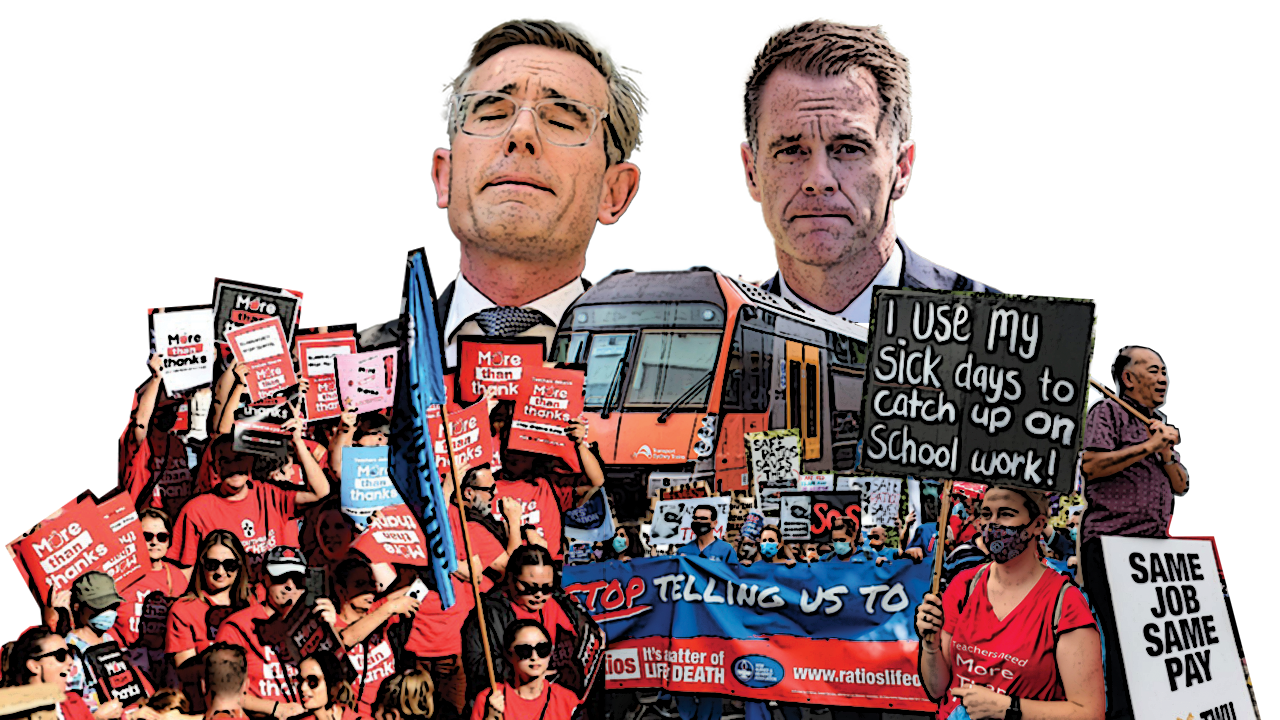For university students, busy with their studies and trying to make a living, politics can seem like a deeply unfamiliar world. With the state election just around the corner, this is an opportunity for us to reflect on what we envision for our state, and society as a whole. Even for those who have no faith in the two-party system, it is an opportunity to look at what mainstream politics fails to achieve, and fight for more.
The Coalition has been in power for over a decade, and we have seen the effects of austerity pervade all parts of New South Wales. Figures from March last year show that one-third of Sydney trains are late, hospital patients are having to wait 36 hours to be admitted into hospitals, and student-to-teacher ratios are amongst the worst in the country at 14.2. Though COVID has placed an added strain on our public institutions, it has exposed the flaws in the existing systems, and the lack of support crippling the people who run our state.
When they came into power in 2011, the Coalition government introduced a public sector wage cap at 2.5%, tying public sector workers to static pay rises under the guise of fiscal responsibility. Though the Perrottet government has since increased the cap to 3%, with a potential 0.5% increase in 2023-2024, this is plainly inadequate under record inflation rates, currently sitting at almost 8%.
Last year, there were waves of industrial action by public sector workers who have been neglected and underappreciated through these restrictive policies. Teachers protested against unmanageable workloads due to staff shortages. Teachers have cited overwhelming class sizes and many hours outside of school hours to stay on top of work. Healthcare workers went on four rounds of strikes to demand better working conditions after keeping the state afloat during the pandemic. Nurses and midwives demanded reasonable staff-to-patient ratios to control workloads with workers facing severe burnout, and in some cases, symptoms similar to PTSD. Transport workers went on strike to fight for a pay rise above inflation rates, safer working conditions, and an end to privatisation.
In response, the government has shown a firm anti-worker stance. They’ve openly displayed hostility towards unions, with the current Premier threatening striking workers with increased fines and characterising strikes more broadly as “unreasonable”. They have condemned striking workers for disrupting the smooth flow of the state’s operations.
What the government fails to see is that strikes are meant to be disruptive and protest against their failure to support working communities. In fact, there is nothing easy about working or living in New South Wales in the first place. Driven by record-high inflation and stagnant wages, the cost of living crisis leaves many families struggling to put food on the table. Students are having to choose between getting an education and buying the bare necessities. This is in an environment where corporations are raking in record profits during the COVID pandemic.
Though the cost of living crisis has only entered mainstream discourse in recent times, the housing crisis has left many struggling to find a home, or without one at all. Rental rates continue to soar, with units increasing 17.6% and 14.6% for houses in the past year. The National Rental Affordability Scheme (NRAS) set up by the Rudd Government to subsidise rentals for low-income households is coming to a close, with a proposal to build 30,000 houses over the next five years insufficient to match demand.
Though housing affordability is obviously a national issue, it is particularly pressing for our state. From the 2016 census, 38,000 people were homeless in New South Wales, and in the past five years the monthly number of people accessing homelessness services increased by 8%. The NSW state government has shown no willingness to adequately address this issue by excluding state-funded social housing in its COVID recovery plans; their plans are limited to demolishing existing public housing for more land, and sold to generate funds.
Instead of funding projects for the public good, the government has sought a policy of privatisation. Though the Premier has pledged not to privatise any more state assets, documents indicate that the Coalition has surveyed the possibility of privatising Sydney Water. In the past, the Berejiklian government privatised WestConnex despite no obvious benefit for reducing travel times, offering a low cost, high-profit project for construction companies. Sydney is the most tolled city in the world.
In all facets, the government has consistently shown an inability to meet the needs of people in our state.
Beyond their failure to provide adequate support, the government has been riddled with scandals and corruption. The NSW Coalition has a history of pork barrelling, with the sports rorts affair involving millions poured into wealthy sports clubs whilst public schools and smaller clubs were without basic equipment. Since 2014, the government has been working with the Transport Asset Holding Entity (TAHE) to shift billions onto a shell company to cover up budget deficits. Apart from these scandals, the government has presided over a police force which has misused their strip search powers, and continuing anti-protest sentiments and policies.
It’s been a long twelve years. This article touches on only some of the govenment’s suite of failures. The sheer extent of privatisation, corruption, and austerity under this government is overwhelming.
Our criticism of the Coalition is not to prop up the Labor Party, or the Greens. Labor in particular, is offering a weak set of solutions to the serious issues facing NSW. Whoever wins the election this Saturday will have an obligation to address these deeply rooted problems in our state — it’s easy to make promises, but it’s another to follow through. The people of New South Wales deserve a government ready to provide affordable housing, support the public sector, and address the cost of living crisis.
Disclaimer: Katarina Butler, Ethan Floyd, and Luke Mesterovic are current members of the Labor Party, and have not participated in Honi’s coverage of the state election.





